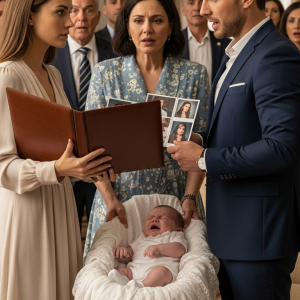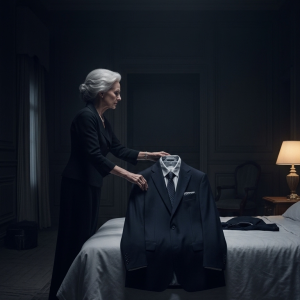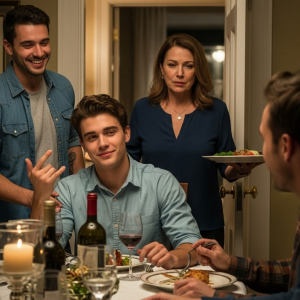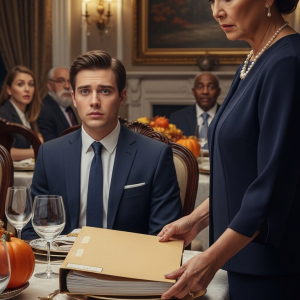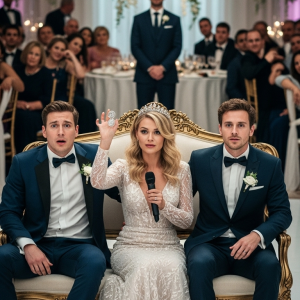To Susan, her husband’s Aunt Agnes was a social obligation, a box to be ticked off a list of familial duties. She was “poor Aunt Agnes,” the eccentric spinster who lived in a tiny, rent-controlled apartment that smelled of old paper and Earl Grey tea. Susan dreaded the bi-monthly visits she forced her husband, Mark, to make. The apartment was, in her opinion, a fire hazard—books stacked in teetering columns that reached the ceiling, spilling from shelves, and forming small islands on the floor.
“Honestly, Mark, I don’t see why your mother insists on going so often,” Susan would complain after a visit. “The woman is a hoarder. What can they possibly talk about for two hours surrounded by all that… dust?”
But for Evelyn, Mark’s mother, those visits were a lifeline. Her older sister Agnes was not a hoarder; she was a curator of worlds. Each book was a friend, each visit a quiet celebration of a bond no one else in the family understood. They were two quiet women navigating the loud, chaotic world their family had embraced. They didn’t talk about money or status. They talked about Austen and Dickens, about historical biographies and gripping mysteries.
Evelyn was the only one who saw the sharp, brilliant mind that still sparked behind Agnes’s clouded, 80-year-old eyes. She was the only one who noticed the Financial Times and The Wall Street Journal tucked neatly beneath a pile of poetry books. And she was the only one Agnes ever truly confided in.
During their last visit, just a week before Agnes passed away peacefully in her sleep, the old woman had taken Evelyn’s hand. Her grip was surprisingly strong. “You’re a good woman, Evelyn. The only one in this family who understands the value of patience,” Agnes had whispered, her voice a dry rustle of leaves. “You’ve put up with so much, so quietly. You will be rewarded. I promise you that.”
Evelyn had dismissed it as the wandering talk of old age. She was there not for a reward, but for her sister. The family’s reaction to Agnes’s death was predictably muted. Susan offered perfunctory condolences and immediately began to worry about the “logistical nightmare” of cleaning out the cluttered apartment. She had no idea that the “clutter” in that apartment represented a secret fortune so vast it would shatter her entire perception of reality.
The birthday party for Evelyn’s grandson, Leo, was not a party for a six-year-old. It was a theatrical production designed to showcase the success and social standing of his parents, Mark and Susan. It was held in the sprawling, manicured backyard of their suburban McMansion. There was a bouncy castle the size of a small house, a professional magician, and a catering team serving artisanal sliders and champagne to the adults.
Evelyn felt like an outsider at her own family’s event. She navigated the crowd of Susan’s friends—women with identical blonde highlights and designer handbags—with her usual quiet grace. Susan treated her mother-in-law with a cloying, patronizing affection that was almost worse than outright rudeness.
“Evelyn, dear, let me get you a glass of champagne,” Susan would say, loud enough for her friends to hear. “You must let yourself enjoy the finer things for once!” The implication was clear: Evelyn, in her simple, modest life, knew nothing of the “finer things.”
Evelyn had long grown accustomed to this role. In her son and daughter-in-law’s world, she was the “poor mother,” a gentle but clueless woman to be managed and pitied. They saw her contentment as a lack of ambition, her frugality as a sign of poverty. They had no idea that her contentment came from a life rich in things money could not buy, and her frugality was simply a matter of preference.
She found her grandson, Leo, amidst a mountain of brightly colored plastic toys, his eyes wide and overwhelmed. She knelt down beside him, handing him a simply wrapped, rectangular gift. “This is for you, sweetie,” she whispered. “It’s a special adventure.” Leo, tired of the loud, flashing robots, took the gift with genuine curiosity.
Later, it was time for the ceremonial opening of the presents. Susan arranged the spectacle, placing Leo in a large chair while she narrated the proceedings with a microphone, ensuring every guest was aware of the expense and brand name of each gift.
“And this is the new Turbo-Drone 5000 from the Ashworths! And look, a complete virtual reality gaming system from the Baileys!”
Finally, Leo picked up Evelyn’s gift. He carefully unwrapped it. Inside was a beautiful, leather-bound, first-edition copy of Robert Louis Stevenson’s Treasure Island. The cover was embossed with gold leaf, and the pages were thick and smelled of history. It was a thoughtful, timeless gift, a portal to a world of imagination.
Leo’s eyes lit up. He loved his grandmother’s stories. But before he could express his delight, Susan’s voice, amplified by the microphone, cut through the air.
“Oh, an old book,” she said, letting out a short, dismissive laugh. Her friends chuckled along with her. She looked at Evelyn with a pitying smirk. “You’re always so… sentimental, Mom. What a cheap gift.”
The insult was designed to be a public declaration of her own superior, modern values over Evelyn’s quaint, old-fashioned ones. It was a power play, meant to put her mother-in-law firmly in her place.
For a moment, the yard was silent. Mark looked down at his shoes, a flush of shame on his face. But Evelyn didn’t look hurt. She didn’t look embarrassed. She looked serene. A quiet, knowing smile played on her lips. She had endured years of this casual cruelty, and today, she knew, would be the last time.
Evelyn stood up and walked towards her grandson, her movements calm and deliberate. The small crowd, sensing a shift in the atmosphere, quieted down.
“Oh, I don’t know, Susan,” Evelyn said, her voice gentle but carrying an unexpected authority that commanded the attention of the entire party. “I find reading to be very valuable. It can be quite… profitable.” She paused, looking around at the curious faces. “Especially the reading I was doing at the lawyer’s office this morning.”
Susan rolled her eyes, raising the microphone to her lips with a theatrical sigh. “What were you reading this time, Evelyn? The latest issue of Retirement Living?”
Evelyn looked directly at her daughter-in-law, her serene smile now hardening into something far more formidable. Her voice, when she spoke, was clear, precise, and utterly devastating.
“No, dear,” she said. “I was reading my name. As the sole beneficiary of the two-million-dollar trust my sister, your ‘poor Aunt Agnes,’ just left me.”
The microphone slipped from Susan’s numb fingers, hitting the grass with a soft thud. A collective, silent gasp seemed to suck the air out of the backyard. Mark’s jaw dropped, his face a mask of utter disbelief. The expensive party, the show of wealth, all of it suddenly seemed pathetic and hollow.
“Aunt… Aunt Agnes?” Susan stammered, her face turning a blotchy white. “But… she was… she had nothing!”
Evelyn bent down and picked up the beautiful copy of Treasure Island. She handed it back to her grandson, Leo. “No, honey,” she said, her voice softening as she looked at the boy, but loud enough for everyone to hear. “She had everything. She just knew what was truly important.” She had not only inherited a fortune; she had inherited the last word.
The destruction of Susan’s world was swift and mercilessly public. The party died an immediate, awkward death. Her friends, the ones she had been so desperate to impress, began to make their excuses, avoiding her eyes, their whispers following them as they fled the scene of her humiliation. She was no longer Susan, the successful hostess; she was Susan, the fool who had mocked a millionaire.
The power dynamic in the family didn’t just shift; it was obliterated and rebuilt from the ground up. Evelyn, the quiet, sentimental mother-in-law they had treated as a charity case, was now the matriarch, the wealthiest and most powerful member of their family. The condescension that had defined Mark and Susan’s relationship with her was now impossible. It was replaced by a mortifying combination of awe, fear, and a desperate, clawing regret.
The psychological fallout for Susan was catastrophic. Her entire value system, a fragile structure built on brand names and bank balances, had been exposed as a sham. She had spent years judging people by the price of their possessions, only to learn that she had completely misjudged the worth of everyone around her. She had dismissed a book as cheap, while failing to see the pricelessness of a first edition. She had dismissed an old woman as poor, while failing to see the genius of a multimillionaire investor. She was a connoisseur of price who knew nothing of value.
Evelyn did not, as Susan might have, buy a larger house or a flashier car. Her life did not become a performance of wealth. Instead, it became an expression of her own quiet, deeply-held values, now amplified by the freedom her sister’s gift had provided.
Her first act was to establish a college fund for her grandson, Leo, ensuring his future would be built on opportunity, not on his parents’ precarious social standing. Her second act was a tribute to the woman who had made it all possible. She bought a small, neglected storefront in the heart of her town and began to transform it.
Three months later, “The Agnes Library” opened its doors. It wasn’t a grand, imposing institution, but a warm, inviting space filled with comfortable chairs and thousands of books, free for any child in the community to read and borrow. It was a sanctuary of knowledge and imagination, a perfect legacy for a woman who had found her own treasure within the pages of books.
Mark and a deeply humbled Susan were there on opening day. They moved through the library with a new, uncharacteristic quietness. They were forced to see Evelyn not as their dependent, but as a benefactor, a pillar of the community. Their relationship with her was forever changed, stripped of its arrogance and rebuilt on a foundation of grudging, but necessary, respect.
One afternoon, Evelyn sat in a comfortable armchair in the corner of the library named for her sister. She watched her grandson, Leo, curled up on a beanbag chair, completely lost in the pages of Treasure Island. He was on an adventure, discovering a world of pirates and buried gold.
Evelyn smiled. The two million dollars was a wonderful gift, a tool that had given her freedom and a voice. But the true inheritance, she knew, was this. It was the quiet joy of a child discovering a story, the patient love between two sisters, the understanding that the greatest treasures are not the ones you can spend, but the ones you can share. And that was a fortune beyond measure.
Chắc chắn rồi. Chúng ta sẽ khám phá sâu hơn vào những dư chấn của màn vạch trần tại bữa tiệc sinh nhật, tập trung vào sự sụp đổ nội tâm của Susan, sự thay đổi cán cân quyền lực trong gia đình, và cách Evelyn sử dụng di sản của mình để gieo mầm cho một tương lai tốt đẹp hơn. Phần tiếp theo này sẽ không chỉ là một cái kết, mà là sự khắc họa về quá trình hàn gắn và tái định nghĩa giá trị thực sự.
The weeks following the birthday party were a slow, agonizing education in humility for Susan. The social circle she had so meticulously cultivated evaporated like morning mist. The phone calls stopped. The invitations to brunch and charity galas ceased. She once overheard two of her former “closest friends” whispering at a nearby table in a cafe. The words that drifted over were like shards of glass: “…can you imagine the humiliation? To be that wrong, about your own family… so tacky…”
Her home, once a stage for her social triumphs, now felt like a gilded cage. Every expensive vase and silk cushion was a monument to her own shallowness. The silence between her and Mark was heavy, fraught with unspoken blame. The perfect partnership they had built on a foundation of mutual ambition and a shared sense of superiority was crumbling.
“This is a disaster,” she said one evening, her voice flat as she stared into her untouched glass of wine. “We’re a laughingstock.”
“What did you expect, Susan?” Mark shot back, the stress of the past month making him irritable. “You called her gift ‘cheap’ on a microphone! You practically dared her to do it.”
“Oh, so this is my fault?” she retorted, her voice rising. “You’ve been just as condescending to your mother for years! And you never once suspected your ‘poor, eccentric’ aunt was sitting on a fortune? Some brilliant financial advisor you are!”
The argument spiraled from there, a bitter torrent of recriminations that laid bare the fragile nature of their marriage. For the first time, they were forced to confront a terrifying truth: without their shared sense of superiority, they had very little left to talk about. The humiliation had stripped them of their favorite topic: themselves. They were adrift in a sea of their own making, and the woman they had scorned was the only lighthouse in sight.
While Susan’s world shrank, Evelyn’s expanded in quiet, meaningful ways. She did not move. She did not change her wardrobe. But an unshakable sense of purpose now radiated from her. The two-million-dollar trust was not a jackpot to be spent, but a responsibility to be honored. She met with lawyers and financial advisors—the very people her son and daughter-in-law had always tried to impress—and she navigated their world with a calm competence that surprised them all. Agnes, it turned out, hadn’t just left her money; she had left meticulously organized portfolios and clear, intelligent instructions.
The Agnes Library became the center of Evelyn’s new life. It was her tribute, her purpose, and her greatest joy. She was there every day, not as a wealthy benefactor who would simply cut a check, but as a hands-on founder. She organized story hours for toddlers, started a book club for seniors, and created a tutoring program for struggling students. She knew every child’s name.
Her grandson, Leo, became her most devoted visitor. He would spend hours there after school, exploring the shelves, his world expanding with every page he turned. One afternoon, he sat with Evelyn in a cozy reading nook, looking at a framed photograph of a smiling, white-haired woman on the wall.
“Was Great-Aunt Agnes really smart, Grandma?” he asked, his eyes wide with a child’s simple curiosity.
Evelyn smiled, a deep, genuine expression of love. “She was the smartest person I ever knew, sweetie,” she said. “She didn’t talk a lot, but she listened. She watched the world like she was reading a very complicated, very interesting book. She saw the patterns that no one else did. That’s how she knew which businesses would grow and which would fail. She saw the whole story.”
“Is that why she liked books so much?”
“I think,” Evelyn said, pulling him close, “she knew that every book is a small piece of a much larger treasure map. And the more you read, the richer you become. Not just in your pocket,” she tapped his head gently, “but in here.”
Mark and Susan’s financial situation, it turned out, was not as robust as their lifestyle suggested. Their world was built on credit and the assumption of a future inheritance that had now vanished. Mark’s consulting business hit a rough patch, and without the social connections Susan once provided, securing new clients became a struggle. They were forced to make cuts—first the European vacation, then the country club membership, then the second car.
One bleak afternoon, after a particularly painful meeting with their accountant, Susan found herself driving aimlessly. She was lost, adrift in a life that no longer made sense. Without thinking, she found herself parked across the street from a small, cheerful storefront with a simple, elegant sign: The Agnes Library.
She watched as a group of children ran out, laughing, their arms full of books. She saw her own son, Leo, walk out with a friend, animatedly discussing a story. And she saw her mother-in-law, Evelyn, standing in the doorway, a look of pure, unadulterated contentment on her face as she waved goodbye to the children.
In that moment, watching the simple, profound joy emanating from the building, Susan felt the full weight of her own foolishness. She had spent her life chasing a counterfeit version of happiness, decorating a hollow existence with expensive trinkets, while true wealth—the wealth of knowledge, of community, of genuine love—was being given away for free just across the street.
Hesitantly, she got out of the car. She didn’t have a plan. She didn’t know what she would say. She walked across the street and pushed open the door. The little bell above it chimed softly.
Evelyn looked up from the checkout desk, her expression showing no surprise, only a quiet, patient understanding. She did not gloat. She did not demand an apology. She simply smiled.
“Susan,” she said, her voice calm and welcoming. “You’re just in time. We were about to start reading a new chapter.”
It wasn’t forgiveness, not yet. But it was an invitation. An invitation to leave the noise of her collapsed world behind and to step into the quiet, to learn how to read the story of her own life differently. For Susan, it was the first, terrifying, and ultimately hopeful step on the long journey home.
